
Alte illyrische Code Leke Dukagjini Tour
Viele ausländische und albanische Autoren fühlen sich von den authentischen Werten Albaniens angezogen, die von den pelasgisch-illyrischen Zeiten bis in die Moderne weitergegeben wurden, wobei die meisten Teile im Laufe der Jahrhunderte entweder...
- 6 Stunden
- Gedruckter Gutschein
- Führer inklusive
Viele ausländische und albanische Autoren fühlen sich von den authentischen Werten Albaniens angezogen, die von den pelasgisch-illyrischen Zeiten bis in die Moderne weitergegeben wurden, wobei die meisten Teile im Laufe der Jahrhunderte entweder assimiliert oder konvertiert wurden.Diese Reise führt Sie nach Mirdita, einer der authentischsten Regionen Albaniens, die nach der vollständigen Invasion von Lezha nach dem Tod Skanderbegs im Jahr 1468 bekannt wurde, da viele entweder im Krieg starben, nach Italien oder an andere Orte auf dem Balkan flohen oder in die Berge flohen, um zu überleben, wie die Region Mirdita in diesen Jahrhunderten besiedelt war. Mit ihren Schriften und Studien, denn sie haben dort „eine einzigartige Welt“ entdeckt, die die Aufmerksamkeit von Gelehrten und Beobachtern aus ganz Europa verdient.Das Drama menschlicher Trauer, bitteres Schicksal, Laune, die spannenden Dilemmata für die Vermittlung von Selbst, Kanon und katholischer Religion spielen sich kontinuierlich im epischen Theater ihrer Gipfel ab. „Schlecht zu leben und noch schlimmer zu sterben“, sagt ein sehr altes Sprichwort aus Mirdita, das Sie über den bekannten philosophischen Vers von Shakespeare „Sein oder nicht sein“ nachdenken lässt. Nach den Daten wurde die erste Erwähnung des Namens „Mirdita“ in Orosh gemacht. Hier residierten die Führer der Region und die Abtei.Die Region Mirdita wird als das Land der Illyrer und Pirusts erwähnt. Archäologische Funde zeigen, dass die Bewohner seit der Steinzeit (4500-2500 v. Chr.) hier waren. Im 19. Jahrhundert und zu Beginn des 20. Jahrhunderts wird Mirdita als die geografische Vereinigung von 12 Einheiten bezeichnet, die als „12 Bajraks“ (Flaggen) von Mirdita bezeichnet werden. Mirdita war die markanteste Region für den Schutz und die Funktionsweise traditioneller Rechte unter dem Kanun.Der Kanun oder formell der Kanuni i Lekë Dukagjinit (englisch: The Code of Lekë Dukagjini) ist ein Satz von Gesetzen, der über Generationen weitergegeben wurde und erst im 19. Jahrhundert von Shtjefën Gjeçovi kodifiziert und niedergeschrieben wurde. In diesem Buch wurde der Kodex in mehrere Abschnitte unterteilt: Kirche, Familie, Ehe, Haus, Vieh und Eigentum, Arbeit, Eigentumsübertragung, „Besa“ – Gesprochenes Wort, Ehre, Schadenersatz, Recht in Bezug auf Verbrechen, Gerichtsgesetz und Ausnahmen und Ausnahmen.Obwohl der Kanun dem albanischen Fürsten Lekë Dukagjini zugeschrieben wird, entwickelten sich die Regeln im Laufe der Zeit als Mittel, um diesen Ländern Gesetze und Regeln zu bringen. Aus einigen Studien wie Kazuhiko Yamamoto „The ethical structure of the Kanun and Cultural Implications“ wird angenommen, dass der Kanun Jahrtausende alt ist. Das Regime von Enver Hoxha versuchte, die Praxis des Kanun zu stoppen.Besuchen Sie Orosh (Kirche Shën Llezhdër (seit 1319), berühmte „Kulla“), dann kehren Sie nach Rreshen und Rubik zurück.
Preise
Inklusive
- Führer
- Transport Transport
- Abgabe im Hotel.
- Abholung vom Hotel


